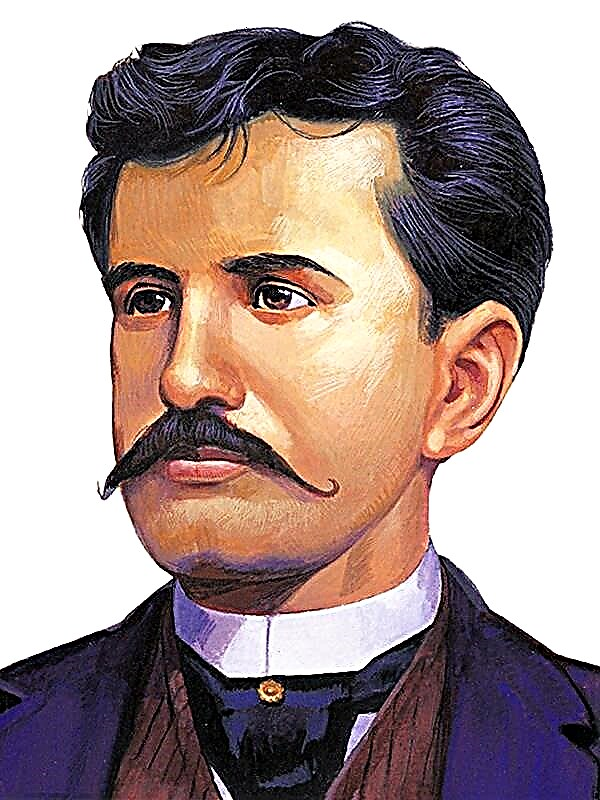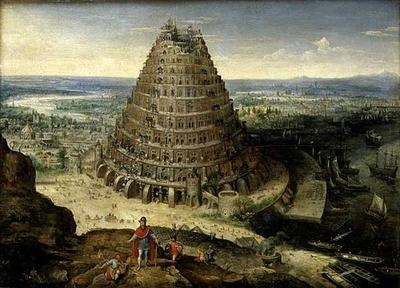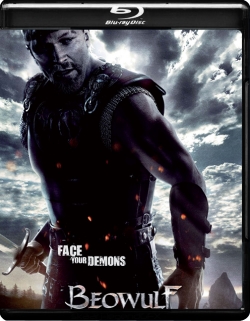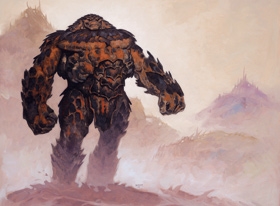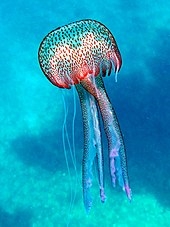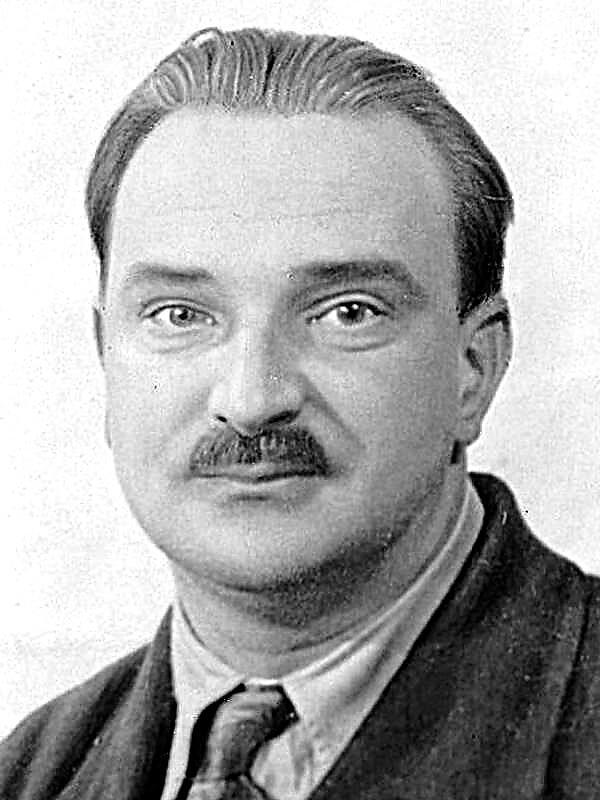The plot is based on a genuine event - a rebellion on the English brig "Bounty" (first half of the 18th century).
The boundless waters of the Pacific Ocean. The handsome "Blossom" is rapidly flying through the waves. The third assistant captain Adam Parsel admires the ship, but at the sight of exhausted sailors he becomes ashamed of the fact that he is well dressed and had a hearty lunch. The team is completely baited by Captain Bart.
The Boatswain Boswell watches as the deck clears. There are guys in the outfit who can stir up the whole crew: these are primarily the Scot MacLeod, the Welshman Becker and the half-breed White. Young Jimmy crawls out of the galley with a bucket of dirty water. Not noticing the appearance of the captain, he pours water against the wind, and a few drops fall on Bart's frock coat. The captain unleashes his powerful fist on the boy - the young man falls dead. Further events are developing rapidly. It seems as if Baker does not hear Bart’s order to throw the body overboard, and Parcel asks for permission to read the prayer. Captain Richard Mason, who was a nephew of Jung, shoots at Bart. Giant Hunt, having received an undeserved blow molt, turns the boatswain's neck. MacLeod cracked down on second assistant John Simon, who tried to take power on the ship.
The way to the homeland rebels ordered. They sail to Tahiti to stock up on water and food. But English ships come here too often, and Mason offers to settle on an island lost in the ocean. Soon, Parcel brings a list of nine volunteers. Each has its own reasons. Mason, Macleod and Hunt in the homeland are waiting for the noose for the murder. Parsel and Becker entered into an open conflict with Bart, which under the circumstances does not bode well. Young Jones is ready to go to the ends of the world for Becker, and shorty Smage - for Macleod. The yellow-faced White is afraid of retribution for old sins: he once stabbed a man. Only the motives of Johnson, the oldest of the sailors, are not entirely clear. Later it turns out that he went swimming, fleeing from his vixen wife.
Parcel has already been to Tahiti. He knows the language and customs of the good islanders well. In turn, the Tahitians wholeheartedly love Adamo, and their leader Otu proudly calls himself his friend. Parcel is greeted with glee: the lieutenant moves from hug to hug, and Mason really dislikes this. However, he willingly accepts the help of the “blacks”. Six Tahitians and twelve Tahitians agree to relocation. But Mason refuses to take on board three more women - this means that some colonists will be left without a couple. The lieutenant Parsel is not threatened with this: the golden-haired slender “peritani” (British in the Tahitian language who do not pronounce the letter “b”) is passionately loved by the dark-skinned beauty Ivoa, daughter of Ota. On the ship is their wedding. Soon, other unions of sympathy arise: the enormous Omata becomes Hunt's girlfriend, the pretty Avapui chooses Baker, the young Amureya is imbued with passionate feelings for young Jones. The lovely Itiah is flirting openly with Parcel. The lieutenant timidly rejects her courtship, which amuses the other women very much - according to their concepts, a fleeting love "game" can in no way be considered a betrayal of his lawful wife. Good relations deteriorate during a sea storm: Tahitians, unaccustomed to a storm, get into the hold, and it seems to the sailors that the "black" betrayed them. When an island arises on the horizon, Mason proposes to exterminate the natives, if any. To this end, the "captain" teaches Tahitians to shoot a gun. Fortunately, the island is uninhabited. Brother Ivoa Meani immediately notices his main flaw: the only source of fresh water is too far from a place suitable for housing.
Colonists begin to settle on the island. Tahitians settle in one hut, the British prefer to live separately. Sailors cancel officer ranks. Power on the island goes to the assembly, where all decisions are made by a majority of votes. Despite Parsel’s objections, “blacks” are not invited to parliament. The lieutenant is amazed to see that Macleod has the makings of a remarkable demagogue: Hunt supports him out of stupidity, Johnson out of fear, Smage out of spite, and White out of misunderstanding. Offended to the depths of his soul, Mason is eliminated from all grandfathers. Macleod has a strong majority, and Parsel represents a powerless opposition - he is supported only by Baker and Jones.
Sailors do not want to take into account the interests of the Tahitians in the division of women. However, here Macleoda is faced with failure: challenging Baker, he demands Avapuy, but the Tahitian woman immediately rushes into the forest. Baker is ready to throw himself at the Scotsman with a knife, and Parsed with great difficulty manages to stop him. Then Itia escapes into the woods, not wanting to get White. When shorty Smage declares that he does not recognize the marriage of Parcel with Ivoa as lawful, the mighty Omata weighs a little rat. Mason, to Parcel’s great indignation, sends a note to the assembly asking him to provide him with a woman for housekeeping, and Macleod eagerly meets the former captain in this matter - as Parsel suspects, the Scotsman just wants to put the “blacks” in their place. When Parcel arrives with an apology to the Tahitian hut, he is not greeted very friendly. Ivoa explains to her husband that Meani loves him, as before, but the rest consider him an apostate. Tetahiti, recognized as a leader by seniority, shares this opinion.
The next vote nearly ends in execution. When the sailors decide to burn the Blossom, Mason tries to shoot MacLeod. A furious Scot offers to hang him, but at the sight of a loop, the heavy-minded Hunt suddenly demands to remove "this dirty trick." Parcel won his first parliamentary victory, but his joy did not last long: the sailors set about dividing the land, again excluding the Tahitians from the list. In vain Parcel begs not to inflict such an insult on them - in Tahiti, the most seedy people have at least a kindergarten. Most do not want to listen to him, and then Parsel announces his departure from the assembly - Becker and Jones follow his example. They offer the Tahitians their three plots, but Tetahiti refuses, considering such a section shameful - in his opinion, justice must be fought. Parcel does not want to take the sin of fratricide into his soul, and Becker cannot make decisions without knowing the language. In addition, the observant Welshman noticed that Ohu was jealous of Amurea for Ropati (Robert Jones) and eagerly listened to the words of Timi - the most vicious and hostile of the Tahitians.
MacLeod also understands that war is inevitable. He kills two unarmed men, and the rest instantly hide in the undergrowth. Parcel bitterly says that the British will have to pay dearly for this - Macleod has little idea of what the Tahitian warriors are capable of. The previously peaceful island is becoming deadly. The Tahitians, having ambushed at the source, kill Hunt, Johnson, White and Jones, who went for water. Baker and Amureya are now thinking only of revenge for Ropati - together they are tracking and killing Okhu. Then the women tell Parcel that Becker was shot dead on the spot, and Amureya was hung by the legs and his stomach was torn - this was done by Timi.
In the face of a common enemy, Mason reconciles with MacLeod and demands to judge Parcel for "betrayal." But the decaying Smage votes against the execution, and MacLeod declares that he does not wish the lieutenant harm - in fact, the best days on the island were when the "archangel Gabriel" was in opposition.
Parsel is trying to enter into negotiations with the Tahitians. Timi calls to kill him. Tetahiti hesitates, and Meani becomes furious: how dare this pig offspring encroach on the life of his friend, the son-in-law of the great leader Ota? Women hide Parcel in the cave, but Timi tracks him down - then Parcel first raises his hand at the man. In the last battle, the surviving British and the best friend of Parcel Meani die. The pregnant Ivoah, hiding in the forest with a gun, tells Tetahiti to kill him if at least hair falls from her husband’s head.
While there are lengthy negotiations between women and Tetahiti, Parsel indulges in bitter thoughts: not wanting to shed blood, he killed his friends. If he sided with the Tahitians after the first assassination, he could save Baker, Jones, Hunt - possibly even Johnson and White.
Tetahiti promises not to kill Parsel, but demands that he leave the island, because he no longer wants to deal with the false, insidious “peritani”. Parcel asks for a delay until the baby is born. Soon, little Ropati is born, and this becomes a huge event for the entire colony - even Tetahiti comes to admire the baby. And women hypocritically pity the “old” leader: he is already thirty years old - he will tear himself with his wives. Having exhausted the theme of Tetahiti's imminent death, women start another song: the Tahitians are too black, the peritans are too pale, and only Ropati has the skin as needed - if Adamo leaves, no one will have golden children. Tetahiti listens calmly, but in the end does not stand up and offers Parcel to try out the boat. They go to sea together. The Tahitian asks what Adamo will do if the Peritani landed on the island. Parcel without hesitation replies that he will defend freedom with arms in his hands.
The weather suddenly spoils - a terrible storm begins. Tetahiti and Parcel are fighting side by side with the elements, but cannot find the island in pitch darkness. And then a bright fire flares up on a rock - it is women who lit a fire. Once on the shore, Parcel loses sight of Tetahiti. Of the last forces they seek and find each other. There are no more enemies on the island.



